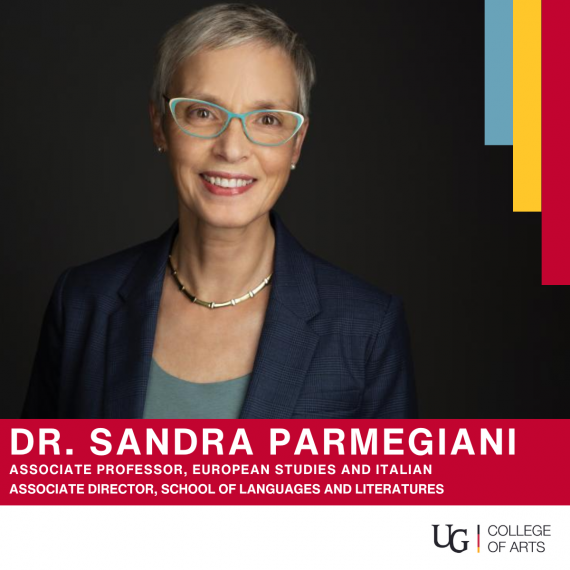European Studies Prof. Wins Prestigious John Bell Award as Educational Leader

Dr. Sandra Parmegiani, associate professor, European Studies and Italian, and associate director of the School of Languages and Literatures in the College of Arts at the University of Guelph, is an inspirational, caring, and determined educational leader whose contributions to the College are innumerable. In a recent interview with the College of Arts’ Marketing and Communications team, Parmegiani shared her perspectives on leadership and teaching and offered thoughtful insights into her professional journey, research, and receiving the prestigious John Bell Award in acknowledgement of the exceptional ways she has impacted education at the U of G.
Parmegiani’s tremendous impact on the College of Arts began with her work to include a College of Arts’ European Studies program as a partner, among other universities around the world, within an Erasmus Mundus association in 2010 for three consecutive cycles, a period of 12 years. The European Commission website notes that the elements of an Erasmus Mundus “[aim at] fostering excellence and worldwide internationalisation of higher education institutions via study programmes – at Master course level – jointly delivered and jointly recognised by higher education institutions (HEIs) established in Europe, and open to institutions in other countries of the world.” Parmegiani explained that she played a key role in organizing the Europe in its Own Eyes, Europe in the Eyes of the Other European Studies conference that year, which hosted European Studies scholars from across the globe. At the conference, she recalled, an international colleague of hers invited the U of G to participate in the Erasmus Mundus. She reflected that the Erasmus Mundus partnership was incredibly successful and allowed the College to welcome a wide range of exceptional, high achieving students.
Parmegiani’s impact permeates many areas, including the realm of Digital Humanities. She shared that she led a digital project entitled Transcultural Journalism: English Novels and the Italian Press (1720-1830), which can be found in the Canadian Writing Research Collaboratory (CWRC). According to the CWRC website, this project “aims to provide an open-access resource of reviews and announcements of English novels in the periodical press during the Enlightenment and the Romantic period (1720-1830)." Parmegiani shared that while she and a researcher based at the Free University of Brussels were working on this project several years ago, she spearheaded the idea for them to co-develop the University of Guelph-Free University of Brussels Master of Arts Dual Degree program.
Parmegiani’s work in the Digital Humanities space extends to the Italian Canadian Narratives Showcase (ICNS), which she explained is a national online repository of researchers and students in the field of Italian-Canadian studies. The site also hosts the work of students from the Italian Heritage and Digital Applications course that Parmegiani created to allow students to learn the basics of Digital Humanities while exploring the Italian-Canadian experience. She also shared that she is working on acquiring a Digital Humanities project focusing on Italian internees in World War II which will be launched in the near future.
Parmegiani’s research is dual-faceted, exploring the past and present and how the two intertwine. Her research on literature in the 18th century, or the Age of Enlightenment, she explained, explores the birth of the novel in 18th century England, its journey and reception throughout Europe, and how the novel shaped individuals’ societal views. The second component of her research, she shared, delves into European Contemporary Literature with a focus on Italian, and considers how we “memorialize the past.” She elaborated that this aspect of her research involves examining persecutions that took place throughout history and aims to incite open and constructive conversations about these devastating events that have historically been silenced. To further this goal, she co-created and teaches a graduate European Studies course in the College titled The History of Violence in 20th Century Europe, which she remarked was a successful endeavour. At the graduate level, she is currently exploring with her students how mutidirectional memory is productively applied in contemporary literature and film, to foster a dialogue between histories of persecution. Through speaking with Parmegiani, it was clear that she approaches sensitive subject matter with compassion. She highlighted the power that fiction has to “promote empathy” and to temper the potential detrimental effects of sensitive material.
Accompanying Parmegiani’s compassion is a genuine interest in the wellbeing, opinions, and long-term success of her students and colleagues. “I think I’m a good listener and I always try to understand what the students need,” she shared. When asked what being an outstanding educational leader meant to her, she responded, “It means the world to me. [To me, it signifies] a contribution to making a better world tomorrow, because we can affect students. We have an impact that we often underestimate.” She expressed her long-standing passion for teaching and watching students flourish and noted that she views teaching as “an equal exchange” between herself and her students. She shared that, while she teaches students, she learns a great deal from them as well.
During her time in the College, Parmegiani has demonstrated that she cares deeply about the work of her colleagues and has made significant efforts to ensure they feel heard, to respond to their needs, and to bolster their success throughout both their challenges and triumphs. Parmegiani also shared that she values consistent conversation between herself and her colleagues. “So often good ideas came from colleagues,” she reflected. It is evident that the admiration and respect she shows her colleagues is mutual – in fact, it was her colleagues who nominated her for the John Bell Award, which she explained is an arduous process. When asked about her sentiments towards receiving the award, she replied that she feels “incredibly honoured.”
During her conversation with the Marketing and Communications team, Parmegiani exuded her enduring positivity and tenacity, expressing her gratitude for working in an innovative and collaborative environment, along with her optimism about the future.